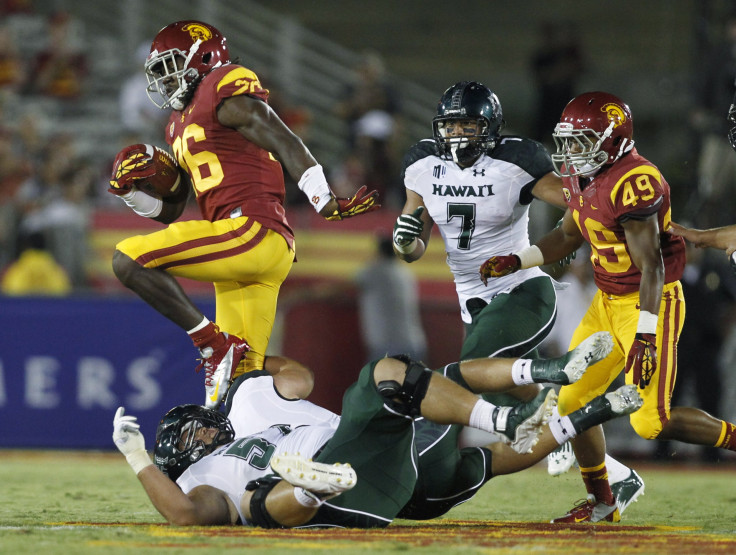Josh Shaw: USC Player's Lies Spark Memories Of Manti Te'o, May Affect NFL Draft Stock

USC defensive back Josh Shaw was finally forced to come clean, after claiming he jumped off a balcony to save his drowning 7-year-old nephew on Saturday night. The fifth-year senior initially claimed he sprained both his ankles while performing the heroic act, but on Wednesday he admitted that the story was a lie.
"On Saturday August 23, 2014, I injured myself in a fall. I made up a story about this fall that was untrue. I was wrong to not tell the truth. I apologize to USC for this action on my part," Shaw said in a statement. "My USC coaches, the USC Athletic Department, and especially coach Sarkisian have all been supportive of me during my college career and for that, I am very grateful."
Head coach Steve Sarkisian suspended Shaw indefinitely, though the injuries already had him sidelined for an unknown amount of time. The first-year coach of the Trojans called Shaw’s behavior “unacceptable,” as he lied to his team and the public just days after he was named a team captain.
While it’s been made known that Shaw didn’t get hurt during any kind of heroic act, it’s still unclear as to how he suffered two high-ankle sprains. His lawyer, Donald Etra, told the Orange County Register that Shaw fell off a balcony, but declined to go into further detail.
Etra claims that Shaw wasn’t involved in any criminal activity and there will be no further investigation, even though TrojanSports.com has confirmed that Shaw was named in a Los Angeles Police Department report. Shaw’s girlfriend told police that the football player matched the description of a man who was seen jumping off a balcony, after a reported break-in. However, he has not been named as a suspect in the alleged incident.
Shaw’s story has become national news, and an embarrassment for himself and the USC program. The incident is expected to blow over soon, as there have been far worse scandals in college football in recent years. Still, the event itself could have an impact on his professional aspirations. Many NFL teams have placed added emphasis on players' character after a string of recent suspensions for felonies.
With the 2014 season kicking off on Thursday night, there has been a great deal of attention to college football this week and a spotlight on some of the top players in the nation. Shaw, a transfer from Florida, was projected as an early second-round pick in the 2015 NFL Draft. A strong season as captain in his final collegiate year for of a Top-25 team could have propelled him into the first round. Now, it’s unknown when he’ll be back on the field following the incident and the injury, and he may have to really impress at the NFL Scouting Combine if he hopes to improve his draft stock and make general managers overlook his transgressions.
The Shaw story sparks memories of the Manti Te’o girlfriend hoax from nearly two years ago. The Notre Dame linebacker, who finished second in the Heisman voting and helped lead his team to the BCS National Championship Game, was eventually caught in a lie of his own. After telling the story about his girlfriend’s death in September, Te’o was forced to admit months later that his girlfriend, Lennay Kekua, never existed. Te'o was drafted in the second round, but sports pundits spent months debating whether an NFL team should take a chance on him.
Shaw's quick fall from grace will likely end sooner than the duration of the Te'o girlfriend hoax. After sports blog Deadspin published the Te'o exposé on Jan. 16, it would remain visible in the news for weeks. It evolved into a water-cooler topic, with media outlets trying to piece together a rather confusing story. The conspirator, Ronaiah Tuiasosopo, would appear on Dr. Phil to explain his actions and behavior, one week after Katie Couric's interview with Te'o and his parents.
But in comparison to other players who have seen their draft stock’s affected by off-the-field incidents, Shaw and Te'o story are relatively tame. When Aaron Hernandez left Florida in 2010, positive drug tests forced him to fall to the fourth round, even though he was considered a first- or second-round talent. The New England Patriots’ gamble paid off for three years, but the worries of NFL scouts would later be confirmed since, as he currently awaits trial for three murders.
Maurice Clarett might be the most drastic example of a player who saw his NFL hopes dashed because off an off-the-field incident in college. In one season with Ohio State, the running back rushed for 1,237 yards, 16 touchdowns and led the Buckeyes to a national title. A year later, Clarett was dismissed from Ohio State, and he was eventually taken with the 101st pick in the 2005 NFL Draft.
© Copyright IBTimes 2024. All rights reserved.






















